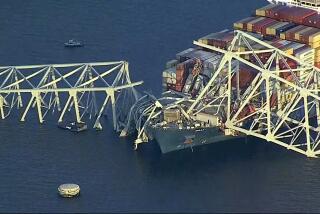After a condo tower falls, a Florida community erects a wall of the missing
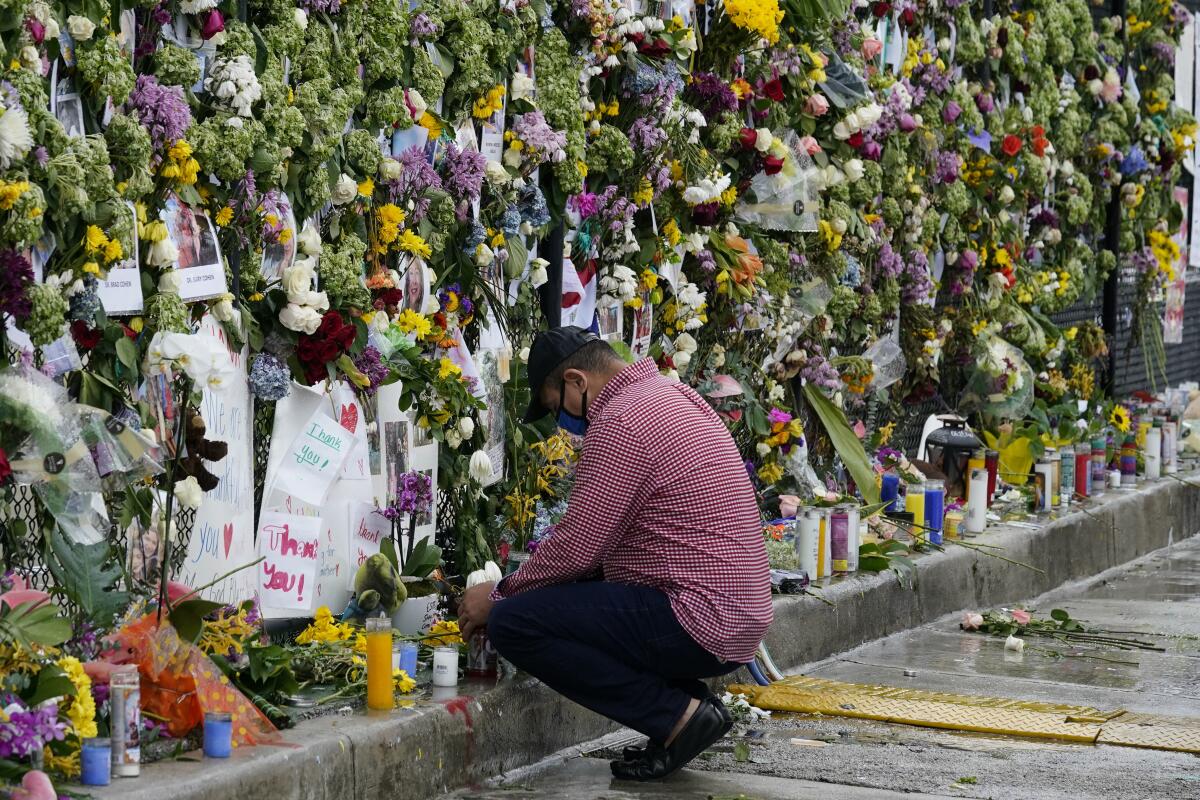
SURFSIDE, Fla. — In the middle of the rubble, a plush Winnie-the-Pooh toy wearing a red shirt that read “Baby’s 1st Pooh Bear” lay on its side, wedged between jagged chunks of concrete and shards of metal.
A rescue worker searching through the debris of the Champlain Towers South for survivors picked it up and dusted it off. Later, a huddle of firefighters walked a block behind the collapsed 13-story condo, past the tennis courts that had turned into a makeshift base camp for rescue workers, to gently set the bear and other toys under a chain-link fence festooned with photos of those who have yet to be found.
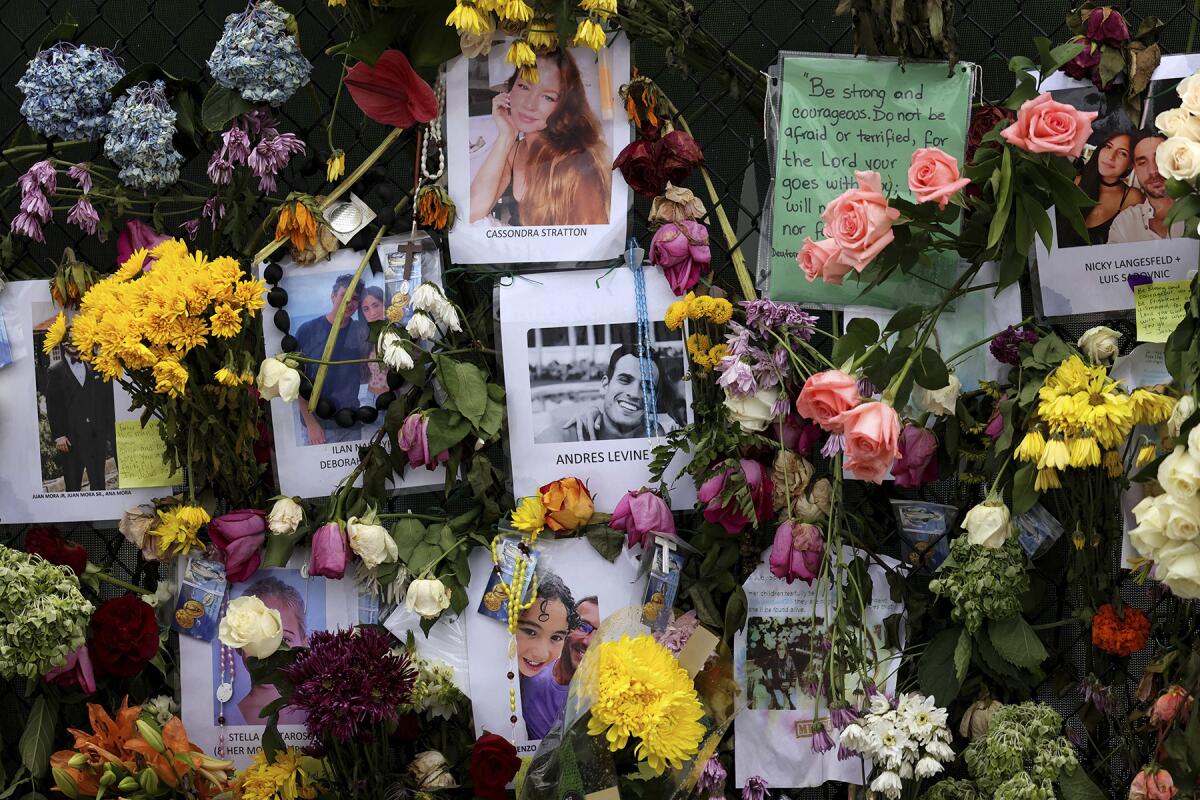
The wall of the missing has become a key landmark in Surfside, a tiny Florida beach town northeast of Miami. A makeshift memorial for those who lived in the tower that suddenly fell last week in the middle of the night, it has become a place to pay tribute to those who have not yet been found but have not necessarily died.
It is also, for many, a place to keep faith that at least some of the 128 people who remain unaccounted for might be alive. Six days after the collapse of Champlain condominium, the death toll had reached 18.
“The two of them are still there,” Mario Gonzalez, 65, said Wednesday morning as he dropped off a bouquet of flowers for his longtime friend Oresme Gil Guerra, who he grew up with in Cuba, and his wife, Betty Guerra. The couple had lived in the tower for a few months.
“We want to see them, but we have to wait,” Gonzalez said as he looked at the ruins of the tower. “God’s got the last word.”
Thousands of people from across the Miami area have flocked to the wall in recent days, enduring sweltering summer heat and torrential tropical storms, to weave fresh flowers into the chain-link fence, drape rosary beads over photos, and scrawl messages to the missing.
“We haven’t been able to keep it out of our mind,” Maria Noble, a 71-year-old retired Surfside resident, said as she stood in front of the memorial with her daughter, Madeline, and wiped away a tear.
“The waiting, the not knowing … ,” she said. “It’s so hard.”
The memorial was set up June 25 by Leo Soto, a 26-year-old hospitality student at Florida International University.
At 4 a.m., he found himself unable to sleep. His former high school classmate Nicole “Nicky” Langesfeld, who lived in the tower with her husband, Louis Sadovnic, was missing.
“They had just gotten married,” he said. “She was a beautiful girl. I remember her smile perfectly.”
Soto also couldn’t stop thinking of a young man he had heard about in media reports as having muscular dystrophy: Luis Bermudez. Family members had said Bermudez could not walk or scream for help, details that haunted Soto. He hoped that Bermudez’s mother, Ana Ortiz, had been able to tell him she loved him.
After scouring the internet for images of the missing, Soto printed out few dozen sheets of paper with photos of the missing and called grocery stores and florists, asking them to donate flowers.
By the afternoon, he was standing on Harding Street, behind the tower, attaching paper with tape to the chain-link fence around the Surfside Tennis Center.
“LAST SEEN IN UNIT 1210: ELAINE SABINO,” one note said. “MISSING”
“Lorenzo and his dad Alfredo Leone,” another said. “MISSING.”
Soto surrounded the pictures with yellow sunflowers and pink and white roses. Below, he lined up a row of Our Lady of Guadalupe glass prayer candles.
As tropical thunderstorms lashed down, a couple who lived near the memorial offered him the use of their laminating machine to protect the photos.
Gradually, the chain-link fence became a riot of blue and green hydrangeas, purple orchids, red and white roses, pink carnations, yellow sunflowers, green eucalyptus and palm fronds.
Some who came to the wall knelt down to pray and light candles. Others dropped off a seashell, a prayer box, a child’s crayon drawing.
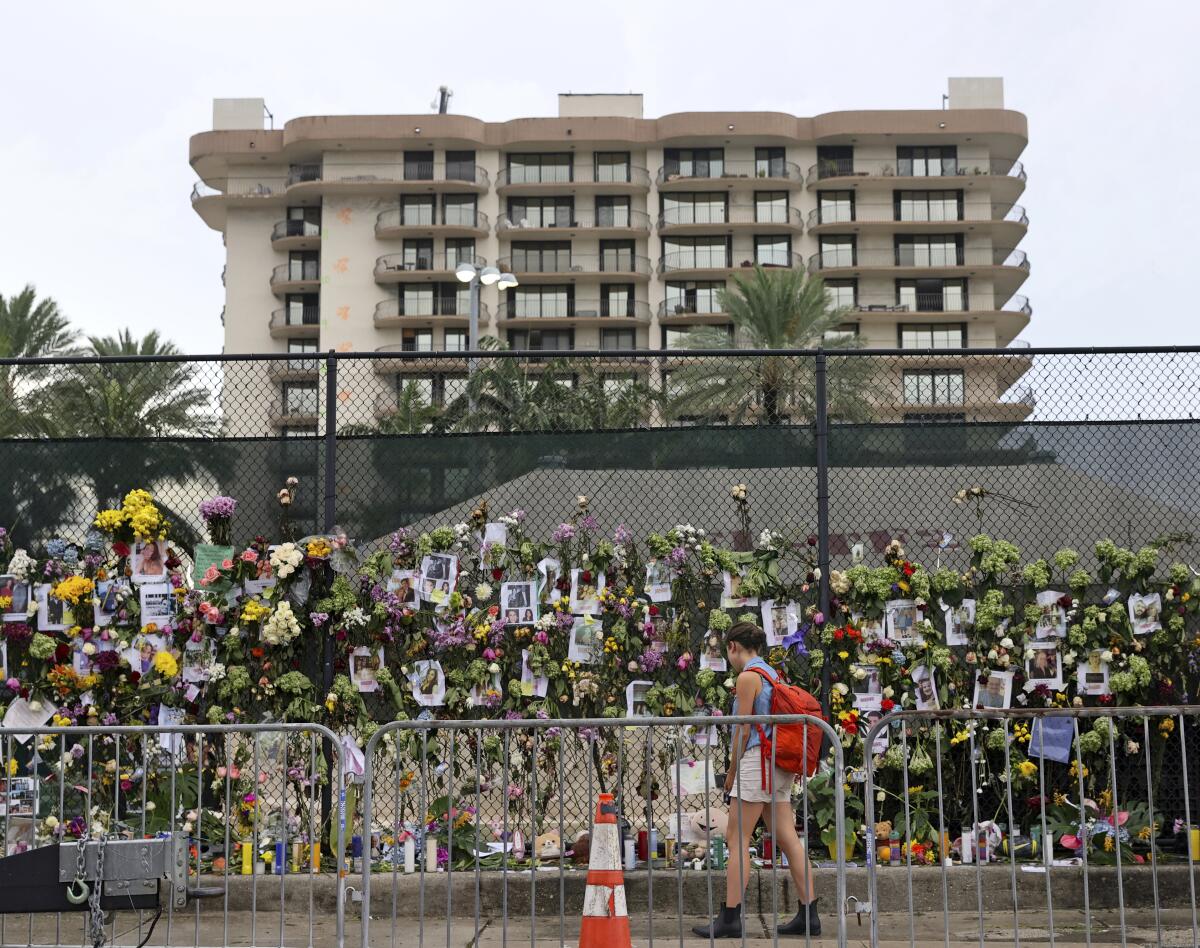
Handwritten religious messages were scrawled in English and Spanish. “Find them Lord!” read a note scribbled on a Post-it.
“Jesus es tu Salvador. Reposa y espera en el,” someone wrote on a sheet of paper encased in plastic.
Other notes were addressed directly to loved ones:
“We are hoping for a miracle! Stay strong amiga❤️.”
“ESTELLE stay strong come home.”
“Arnie and Miriam Notkin. We all love you so much.”
Others paid tribute to the rescue workers who slept in the emergency canvas tents that had been set up inside the tennis courts.
Just behind the memorial wall, their drenched pants, long-sleeved T-shirts and helmets hung on the tennis net.
“Thank you for sacrificing to help others,” someone wrote in red marker. “You work so hard every day to help others.”
At least one rescuer wrote back to the community.
“You are our neighbors. You are our friends. You are our family,” read a note on a Miami-Dade Fire Rescue T-shirt pinned to the wall. “We know you’re hurting. We are hurting too. We just can’t show it yet.”
Teams of rescuers from Florida, Mexico and Israel have worked grueling 12-hour shifts over the last week, removing 3 million pounds of concrete from the pile.
In the midst of the devastation, some have taken the time to gather personal items. On Saturday, Soto stood silent as a group of Miami-Dade firefighters walked up to the wall and lay down dusty toys from the rubble.
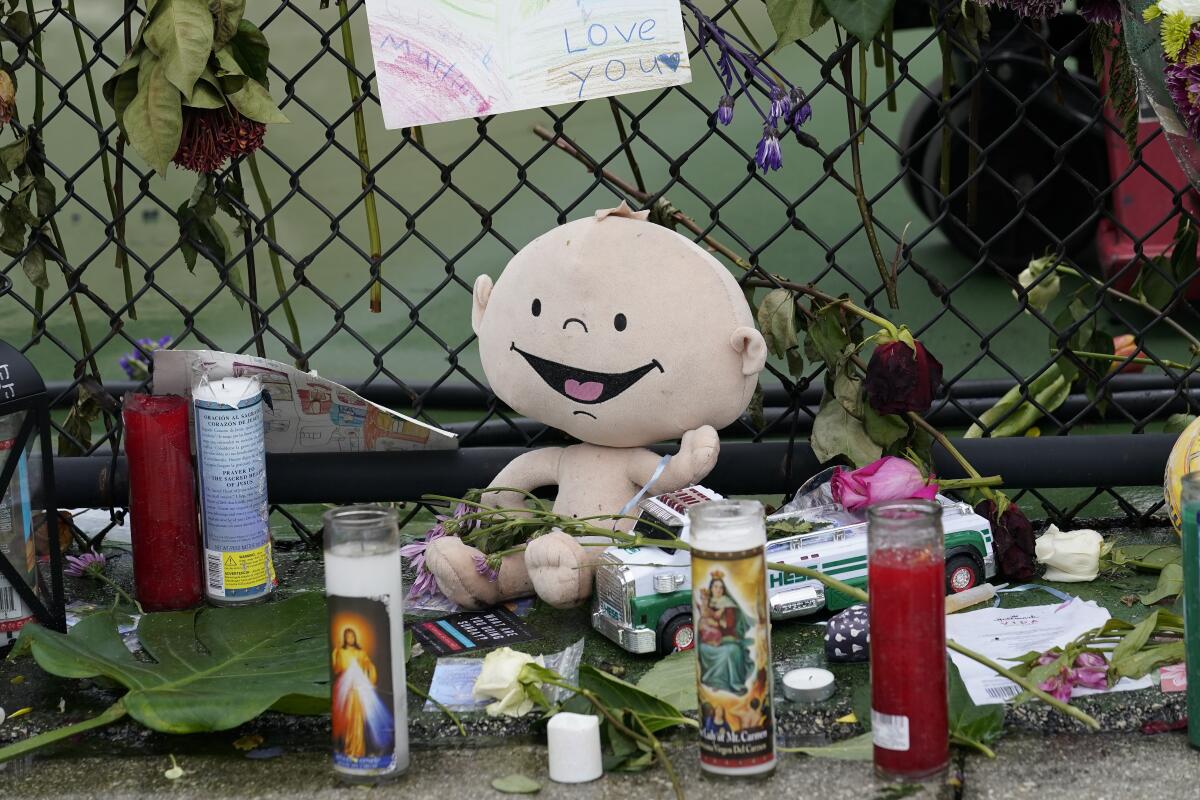
Among the objects that have been placed at the wall: A blue and orange plastic Nerf gun. A stuffed green leapfrog, tattered and charred with a hole in the leg. A Nike football. A unicorn backpack. A Hess flatbed truck.
For a short time over the weekend, the public had been unable to reach the memorial. Frustrated community members were turned away from the site Saturday evening as police blocked off streets around the disaster site.
The following day, Soto approached Gov. Ron DeSantis and other officials, urging them to open up public access to the memorial.
“It’s become almost a sacred place for the community,” he said. “It was the only place where there was love in the air constantly at all times.”
Eventually, the memorial was reopened, and Wednesday, TV crews descended on the wall as Udonis Haslem, captain of the Miami Heat basketball team, visited to hang a wreath and scrawl a message.
Soto said he no longer felt overcome with grief and despondency as he watched the community pull together.
“I’ve seen people I don’t know hug each other, cry with each other,” he said. “The way that they have bonded here, I don’t think this community will ever be the same.”
As dusk fell Wednesday night, a woman bent down in the drizzle to light a tealight. A man wrapped his arms around and pulled her tight. Together they stepped slowly alongside the memorial and looked at the faces of the missing.
More to Read
Sign up for Essential California
The most important California stories and recommendations in your inbox every morning.
You may occasionally receive promotional content from the Los Angeles Times.


